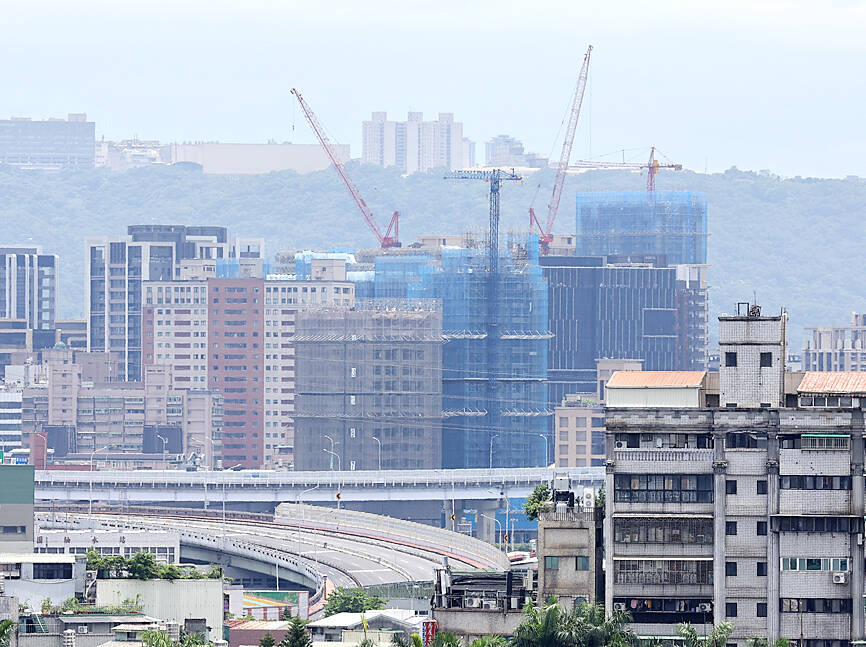Unsold presale houses totaled 47,108 units in northern Taiwan as of last month, accounting for 27.7 percent of the overall volume for sale, heaping price correction pressures on developers, a report by My Housing Monthly (住展雜誌) said on Thursday.
The upcoming ban on transfers of presale house purchase agreements, which the government is still fine-tuning to settle details such as when and how to implement it, would add difficulty to their digestion, the magazine’s research manager Chen Tsai-chi (成采錡) said.
Property transactions, including presale house contracts, tumbled 28 percent year-on-year in the first two months of this year, government data showed, as economic uncertainty and interest rates hikes drove potential buyers to the sidelines.

Photo: CNA
Many developers have opted to postpone or extend construction, giving them more time to digest inventory and ease selling pressure, Chen said.
As of last month, Taoyuan had the highest number of unsold presale houses at 18,115 units, followed by New Taipei City’s 17,520 units, the report said, adding that the number in Yilan County and Keelung were small in comparison at less than 2,000 units.
New Taipei City’s Tamsui District (淡水) had the heaviest supply at 4,013 units, concentrated mainly between Tamsui New Township (淡海新市鎮) and Hongshulin (紅樹林) MRT Station.
Fifteen districts in northern Taiwan had more than 2,000 unsold presale units — Tamsui, Sanchong (三重), Tucheng (土城), Linkou (林口), Wugu (五股) and Jhonghe (中和) in New Taipei City and Bade (八德), Lujhu (蘆竹), Dayuan (大園), Yangmei (楊梅), Jhongli (中壢) and Gueishan (龜山) in Taoyuan, it said.
Unsold presale houses in New Taipei City’s Sanchong District numbered more than 3,000, but are relatively popular due to improving infrastructure and its proximity to the capital, Chen said.
By contrast, projects in Gueishan and Jhongli districts and elsewhere in Taoyuan have been waiting for buyers for extended periods and might become the targets of price concessions given relatively heavy supply, Chen added.

UNCERTAINTY: Innolux activated a stringent supply chain management mechanism, as it did during the COVID-19 pandemic, to ensure optimal inventory levels for customers Flat-panel display makers AUO Corp (友達) and Innolux Corp (群創) yesterday said that about 12 to 20 percent of their display business is at risk of potential US tariffs and that they would relocate production or shipment destinations to mitigate the levies’ effects. US tariffs would have a direct impact of US$200 million on AUO’s revenue, company chairman Paul Peng (彭雙浪) told reporters on the sidelines of the Touch Taiwan trade show in Taipei yesterday. That would make up about 12 percent of the company’s overall revenue. To cope with the tariff uncertainty, AUO plans to allocate its production to manufacturing facilities in

TAKING STOCK: A Taiwanese cookware firm in Vietnam urged customers to assess inventory or place orders early so shipments can reach the US while tariffs are paused Taiwanese businesses in Vietnam are exploring alternatives after the White House imposed a 46 percent import duty on Vietnamese goods, following US President Donald Trump’s announcement of “reciprocal” tariffs on the US’ trading partners. Lo Shih-liang (羅世良), chairman of Brico Industry Co (裕茂工業), a Taiwanese company that manufactures cast iron cookware and stove components in Vietnam, said that more than 40 percent of his business was tied to the US market, describing the constant US policy shifts as an emotional roller coaster. “I work during the day and stay up all night watching the news. I’ve been following US news until 3am

Taiwan will prioritize the development of silicon photonics by taking advantage of its strength in the semiconductor industry to build another shield to protect the local economy, National Development Council (NDC) Minister Paul Liu (劉鏡清) said yesterday. Speaking at a meeting of the legislature’s Economics Committee, Liu said Taiwan already has the artificial intelligence (AI) industry as a shield, after the semiconductor industry, to safeguard the country, and is looking at new unique fields to build more economic shields. While Taiwan will further strengthen its existing shields, over the longer term, the country is determined to focus on such potential segments as

COLLABORATION: Given Taiwan’s key position in global supply chains, the US firm is discussing strategies with local partners and clients to deal with global uncertainties Advanced Micro Devices Inc (AMD) yesterday said it is meeting with local ecosystem partners, including Taiwan Semiconductor Manufacturing Co (TSMC, 台積電), to discuss strategies, including long-term manufacturing, to navigate uncertainties such as US tariffs, as Taiwan occupies an important position in global supply chains. AMD chief executive officer Lisa Su (蘇姿丰) told reporters that Taiwan is an important part of the chip designer’s ecosystem and she is discussing with partners and customers in Taiwan to forge strong collaborations on different areas during this critical period. AMD has just become the first artificial-intelligence (AI) server chip customer of TSMC to utilize its advanced